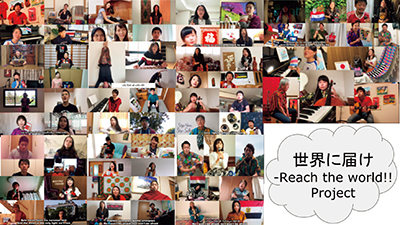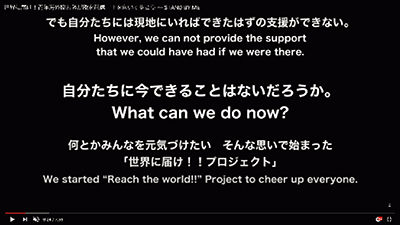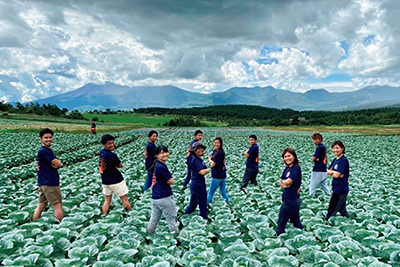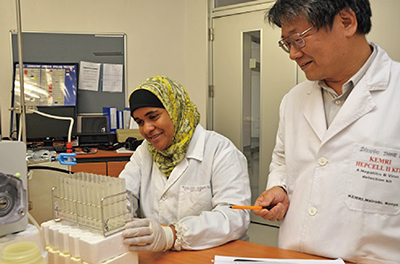(3) Japan’s Development Cooperation in the COVID-19 Era
Japan’s Official Development Assistance (ODA) projects across the world have been affected in no small way by the COVID-19 pandemic.
Since March 2020, due to the spread of COVID-19, Japan Overseas Cooperation Volunteers (JOCVs), JICA experts, development consultants, companies engaged in development cooperation, some NGO personnel, and others had returned temporarily to Japan from developing countries.
When travel from Japan to overseas was restricted and visits to project sites in developing countries were becoming increasingly difficult, they explored creative ways to continue to support projects while being in Japan (see also Project Introduction Column regarding specific initiatives).
The JOCVs (JICA Volunteer) program, a public participatory program that was founded in 1965 and has been delivering results for more than half a century, was also affected by the pandemic. As mentioned above, all dispatched JOCVs had returned to Japan sequentially since mid-March. The dispatch of the third group of FY2019 JOCVs, which was going to be done after April, was suspended. JOCVs have been dispatched to Viet Nam and other countries ready to receive them since the end of November. JOCVs, 577 of them, are waiting in Japan to be dispatched or re-dispatched as of December 1, 2020.
JOCVs waiting in Japan are conducting some activities such as utilizing their skills and experiences to tackle challenges in Japan, continuing JOCV activities remotely, and improving themselves for reassignment. Support for farmers, foreign language support and other responses by JOCVs with medical qualifications such as midwives, nurses, and public health nurses, and support for the education of children with foreign roots are some examples of JOCVs’ contributions to domestic challenges. “Japan Overseas Cooperation Volunteers for Tsumagoi Cabbage” is among the support for farmers. Tsumagoi Village in Gunma Prefecture was facing a serious labor shortage due to the halt of the visit of foreign technical interns. JOCVs who had temporarily returned to Japan supported the Village through collaboration between JICA and a non-profit organization “Shizenjuku Terakoya” from May to November 2020. The participating JOCVs made proposals on improving communication between foreign technical interns and farmers and mitigating various challenges arising from differences in cultural practices.
Most of the JICA experts also had to come back temporarily to Japan. They continued their work through communicating remotely with their counterparts in the field while on standby in Japan. JICA staff members, experts, and others have returned to their assigned countries since June 2020, according to the local circumstances.
Furthermore, JICA trainees who had come to Japan from developing countries were unable to return to their countries due to flight cancellations and other difficulties caused by the pandemic. JICA supports these trainees until their return. As for short-term trainees who were going to come to Japan, JICA has made efforts to conduct their training even during the COVID-19 pandemic through online training and other ways. JICA has sequentially accepted long-term trainees and others since October.
In addition, in order for Japanese NGOs engaged in international cooperation to gather information to strengthen their foundation and capabilities and review their management strategies in response to the COVID-19 pandemic, MOFA convened a FY2020 NGO study group on the theme of “Towards a Resilient Society: Redesigning Japanese NGOs under the Impact of COVID-19 Pandemic.”


Released a video in which JOCVs who evacuated from their posts amid the spread of COVID-19 are singing “Sukiyaki” in the language of their assigned countries (Photo: OKAMOTO Ryuta, WATATU Inc.)

JOCVs working as “Japan Overseas Cooperation Volunteers for Tsumagoi Cabbage” while on standby in Japan (Photo: Shizenjuku Terakoya)

Kenya Medical Research Institute staff member working at a laboratory improved with Japanese grant aid. Japan has been supporting the development of facilities and human resources of infectious diseases control centers in Africa, together with domestic research institutes. (See “Stories from the Field” regarding assistance for the Noguchi Memorial Institute for Medical Research in Ghana, and “Master Techniques from Japan to the World” regarding research on zoonotic virus infections in Zambia.)
